
Bureau of Information and Propaganda
Encyclopedia

Zwiazek Walki Zbrojnej
Związek Walki Zbrojnej was an underground army formed in Poland following its invasion in September 1939 by Germany and the Soviet Union that opened World War II.The precursor to the ZWZ was the Service...
, later of Armia Krajowa
Armia Krajowa
The Armia Krajowa , or Home Army, was the dominant Polish resistance movement in World War II German-occupied Poland. It was formed in February 1942 from the Związek Walki Zbrojnej . Over the next two years, it absorbed most other Polish underground forces...
- in short: BIP) a conspiracy department created in spring 1940 during the German occupation of Poland, inside the Związek Walki Zbrojnej
Zwiazek Walki Zbrojnej
Związek Walki Zbrojnej was an underground army formed in Poland following its invasion in September 1939 by Germany and the Soviet Union that opened World War II.The precursor to the ZWZ was the Service...
, then of the Supreme Command of Armia Krajowa
Armia Krajowa
The Armia Krajowa , or Home Army, was the dominant Polish resistance movement in World War II German-occupied Poland. It was formed in February 1942 from the Związek Walki Zbrojnej . Over the next two years, it absorbed most other Polish underground forces...
(as 6th Department).
Initially, its commander was major Tadeusz Kruk-Strzelecki, then colonel Jan Rzepecki pseudonym "Wolski" or "Prezes". Until the end of 1940 his deputy was Hipolit Niepokólczycki, while since 1944 until January 1945 captain Kazimierz Moczarski
Kazimierz Moczarski
Kazimierz Damazy Moczarski was a Polish writer and journalist, officer of the Polish Home Army...
.
Tasks of BIP included informing of Polish community of activities of the Polish Government in London, documenting activities of the German occupant
Nazi Germany
Nazi Germany , also known as the Third Reich , but officially called German Reich from 1933 to 1943 and Greater German Reich from 26 June 1943 onward, is the name commonly used to refer to the state of Germany from 1933 to 1945, when it was a totalitarian dictatorship ruled by...
, psychological warfare
Psychological warfare
Psychological warfare , or the basic aspects of modern psychological operations , have been known by many other names or terms, including Psy Ops, Political Warfare, “Hearts and Minds,” and Propaganda...
against Nazi propaganda
Nazi propaganda
Propaganda, the coordinated attempt to influence public opinion through the use of media, was skillfully used by the NSDAP in the years leading up to and during Adolf Hitler's leadership of Germany...
, consolidation of solidarity in the fight for independence of the Polish nation, collecting of information, reports and orders. BIP published underground press
Polish underground press
Polish underground press devoted to prohibited materials has a long history of combatting censorship of oppressive regimes in Poland...
, like: Biuletyn Informacyjny
Biuletyn Informacyjny
Biuletyn Informacyjny was a Polish weekly published covertly in occupied Poland during World War II.It was started in November 1939 in Warsaw as the main press release of the SZP, the first underground resistance organisation in Poland. Soon it was taken over by the Armia Krajowa and the Bureau of...
(Information Bulletin), Wiadomości Polskie (Polish News) and Insurekcja (Insurrection); some of its departments carried secret trainings: Department A (film) in photoreport, direction, operation of megaphones.
Among others, cameramen and cutters Antoni Bohdziewicz
Antoni Bohdziewicz
Antoni Bohdziewicz was a Polish screenplay writer and director, best known for his 1956 adaptation of Zemsta by Aleksander Fredro.Bohdziewicz was born in the city of Wilno, then part of the Russian Empire...
, Wacław Kaźmierczak, Leonard Zawisławski, Seweryn Kruszyński, film/stage directors Jerzy Gabryelski, Jerzy Zarzycki
Jerzy Zarzycki
Jerzy Zarzycki was a Polish film director. He directed 24 films between 1931 and 1970. He co-directed the 1933 film The Sea, which was nominated for an Academy Award in 1933 for Best Short Subject ....
pseudonym "Pik", Andrzej Ancuta, photographers Sylwester Braun
Sylwester Braun
Sylwester Braun was a Polish photographer, Home Army officer. He was known as author of photography evidencing the Nazi Occupation of Poland and Warsaw Uprising....
and Joachim Joachimczyk, historian Aleksander Gieysztor, philologist professor Kazimierz Feliks Kumaniecki worked for BIP. Among others, Krystyna Wyczańska and Hanna Bińkowska were its liaisons officers.
Organisation of BIP

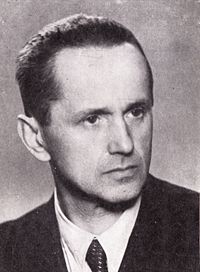
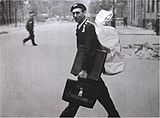
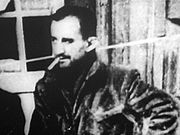
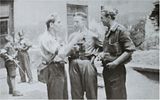
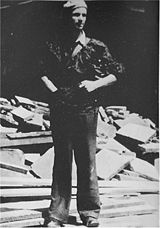
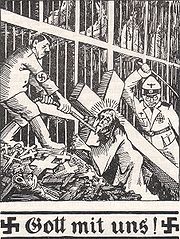
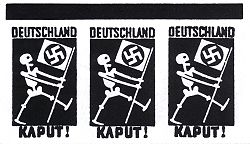
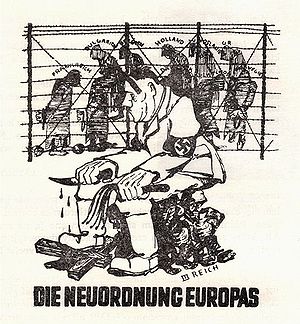
- Secretary – Irena Piasecka pseudonym "Elżbieta", "Kreska"
- Department of Finance – Maria Wielhorska-Szpręglewska pseudonym "Maska"
- Department of Post – name unknown pseudonym "Anna"
- Department of Emergency Liaison – Irena Markiewicz pseudonym "Jaga"
- Department of Microphotography – Andrzej PronaszkoAndrzej PronaszkoAndrzej Pronaszko was a Polish painter and scenographer, one of the most prominent representatives of the Young Poland movement and the Polish avant-garde of the 1920s and 1930s....
pseudonym "Majster" - Department of Current Propaganda – major Tadeusz Wardejn-Zagórski pseudonym "Gozdawa"
- Sekretary office – Hanna Hryniewiecka pseudonym "Maryna"
- Branch bulletins (editorial teams of Biuletyn InformacyjnyBiuletyn InformacyjnyBiuletyn Informacyjny was a Polish weekly published covertly in occupied Poland during World War II.It was started in November 1939 in Warsaw as the main press release of the SZP, the first underground resistance organisation in Poland. Soon it was taken over by the Armia Krajowa and the Bureau of...
(Information Bulletin), "Wiadomości Polskie" (Polish News) and Głos Ojczyzny (Voice of the Homeland)) - Bureau of Military History – doctor Stanisław Płoski pseudonym "Sławski"
- Department of Information – major Jerzy Makowiecki pseudonym "Tomasz", lieutenant Aleksander Gieysztor (pseudonym "Lissowski" or "Borodzicz")
- Sekretary office – Zofia Straszewska pseudonym "Magdalena"
- Bureau of the Department of Information
- Sub-department W – internal situation of occupied Poland – Antoni Szymanowski pseudonym "Brun"
- Office W 1 – occupant's policy, germanisationGermanisationGermanisation is both the spread of the German language, people and culture either by force or assimilation, and the adaptation of a foreign word to the German language in linguistics, much like the Romanisation of many languages which do not use the Latin alphabet...
, German propaganda, recording of acts of terror - Office W 2 – administration, occupant's legislation, self-government institutions
- Office W 3 – economic matters
- Office W 4 – social matters
- Office W 5 – cultural matters
- Office W 1 – occupant's policy, germanisation
- Sub-department P – Kazimierz Ostrowski pseudonym "Łaski"
- Office P 1 – organised political life in the underground
- Office P 2 – communist and communist-like organisations
- Office P 3 – attitude of Polish community
- Office P 4 – problems of social resistance
- Office P 5 – press and program publications of political organisations
- Jewish Department – Henryk WolińskiHenryk WolinskiHenryk Woliński was a member of the Polish resistance movement in World War II, specifically the Armia Krajowa , where he reached the rank of colonel. He was the head of the "Jewish Department" in AK's Bureau of Information and Propaganda. His codename was "Wacław". He was recognized by Yad Vashem...
pseudonym "Wacław"
- Sub-department R of Radio Information – Jerzy Olivier-Merson pseudonym "Wiktor"
- Office R 1 – editorial team of Dziennik Radiowy (Radio Daily)
- Office R 2 – editorial team of Służba Reutera (Reuter News)
- Office R 3 – editorial team of Biuletyn Sztabowy (Staff Bulletin)
- Office R 4 – editorial team of Serwis Kościuszki (Kościuszko News) and "Świt" (The Dawn)
- Local Inspection
- Department of Mobilisation Propaganda – captain Tadeusz ŻenczykowskiTadeusz ZenczykowskiTadeusz Żenczykowski pseudonym Kania, Kowalik, Zawadzki , took part in the Warsaw Uprising of 1944, immediately after the war a member of anti-communist conspiracy in Poland, since 1945 an emigration journalist...
pseudonym "Kania", "Kowalik"- Sub-department of "N" Propaganda (psychological subversion against German community) – captain Tadeusz Żenczykowski
- Section I of Organisation – Antoni Szadkowski pseudonym "Leszek"
- Courier team
- Team of "Service"
- Unit of Legalisation
- Section II of Studies – Michał Mendys pseudonym "Baca"
- Unit of Economy
- Unit of History
- Unit of Domestic Policy
- Unit of Propaganda
- Unit of Press
- Unit of Foreign Affairs
- Section III of Editorial Service – headed by professor Kazimierz Feliks Kumaniecki pseudonym "Kozakiewicz"
- Editorial Teams of German-language clandestine papers "Der Klabautermann", "Die Ostwache"
- Section IV of Special Actions – Kazimierz Gorzkowski pseudonym "Godziemba" or "Wolf"
- Section V of Publication Distribution – Jerzy Rolicki pseudonym "Jacek"
- Section I of Organisation – Antoni Szadkowski pseudonym "Leszek"
- Sub-department of Mobilisation Propaganda "Rój" – Zygmunt Ziółek pseudonym "Sawa"
- Section A of Information and Film – headed by Stanisław Olkusznik pseudonym "Śmiałowski"
- Office of Press – Sławomir Dunin-Borkowski pseudonym "Jaskólski"
- Office of Radio – Stanisław Zadrożny pseudonym "Pawlicz"
- Office of Megaphones – Czesław Kotlarczyk pseudonym "Czema"
- Office of Photography – Wacław Żdżarski pseudonym "Kozłowski"
- Office of Film – Antoni BohdziewiczAntoni BohdziewiczAntoni Bohdziewicz was a Polish screenplay writer and director, best known for his 1956 adaptation of Zemsta by Aleksander Fredro.Bohdziewicz was born in the city of Wilno, then part of the Russian Empire...
pseudonym "Wiktor"
- Section B of Culture Propaganda – Bronisław Rutkowski pseudonym "Korycki"
- Office of Photography – Stanisław Ryszard Dobrowolski pseudonym "Goliard"
- Office of Music – Bronisław Rutkowski pseudonym "Korycki"
- Office of Theatre – Józef Wyszomirski pseudonym "Albin"
- Office of Publication – Józef Sosnowski pseudonym "Brzeziński"
- Office of Bookstores and Libraries – Tadeusz Suchocki pseudonym "Radwan"
- Office of Planning – Mieczysław Jurgielewicz pseudonym "Narbutt"
- Section C of Technical Matters – Kazimierz Dobrowolski pseudonym "Szymczak")
- Section D of Field Propaganda – Stanisław Ostrowski pseudonym "Bogdan"
- Office of Patrols
- Office of Field BIPs
- Office of Equipment
- Section A of Information and Film – headed by Stanisław Olkusznik pseudonym "Śmiałowski"
- Editorial Team of Gawędy Żołnierskie (Soldier's Talks) – Zygmunt Ziółek pseudonym "Sawa"
- Sub-department of Aid for Soldiers – headed by major Hanna Łukaszewicz pseudonym "Ludwika"
- Section of Organisation
- Section of Propaganda and Training
- Section of Economy
- Section of Social Care
- Sub-department "Antyk" – captain Tadeusz ŻenczykowskiTadeusz ZenczykowskiTadeusz Żenczykowski pseudonym Kania, Kowalik, Zawadzki , took part in the Warsaw Uprising of 1944, immediately after the war a member of anti-communist conspiracy in Poland, since 1945 an emigration journalist...
pseudonym "Krawczyk"- Office of Editorial Service – captain Tadeusz Żenczykowski
- Office of Organisation – name unknowm
- Office of Publication Distribution – Bolesław Trenda
- Sub-department of "N" Propaganda (psychological subversion against German community) – captain Tadeusz Żenczykowski
- Wydział Kolportażu – kierownictwo: Wanda Kraszewska-Ancerewicz pseudonym "Lena"
- Secret Military Publishing House – headed by Jerzy RutkowskiJerzy RutkowskiJerzy Rutkowski was a Polish political activist and resistance soldier. During World War II, he joined Polish resistance and was the head of the underground press operation, the Tajne Wojskowe Zakłady Wydawnicze, throughout its operations, from 1940 to 1945...
pseudonym "Michał Kmita"- Secretary – Maria Rutkowska-Mierzejewska pseudonym "Janka"
- Section of Administration – Igor Telechun pseudonym "Łukasz"
- Section of Supplies – Aleksander Wąsowski pseudonym "Józef"
- Section of Technical Matters – Stefan Berent pseudonym "Steb"
- Cell of Drawings – Stanisław Kunstetter pseudonym "Krzysztof"
- Printing house W 2 – Jerzy Paszyc pseudonym "Stefan"
- Printing house W 3 – Władysław Pomorski pseudonym "Jerzy"
- Printing house W 4 – Michał Wojewódzki pseudonym"Andrzej"
- Printing house W 5 – Czesław Mierzejewski pseudonym"Marek"
- Printing house W 6 – Jerzy Mierzejewski pseudonym "Jacek"
- Printing house W 7 – Michał Wojewódzki pseudonym "Andrzej"
- Printing house W 8 – Jerzy Paszyc pseudonym "Stefan"
- Printing house W 9 – Marian Jędrzejczyk pseudonym"Kazimierz"
- Printing house W 10 – Stanisław Stopczyk pseudonym "Antoni"
- Editorial Team of Professional Military Press – lieutenant-colonel Mieczysław Biernacki pseudonym "Mieczysław"
- Insurekcja (Insurrection) – Mieczysław Biernacki
- Żołnierz Polski (Polish Soldier) – Mieczysław Biernacki

